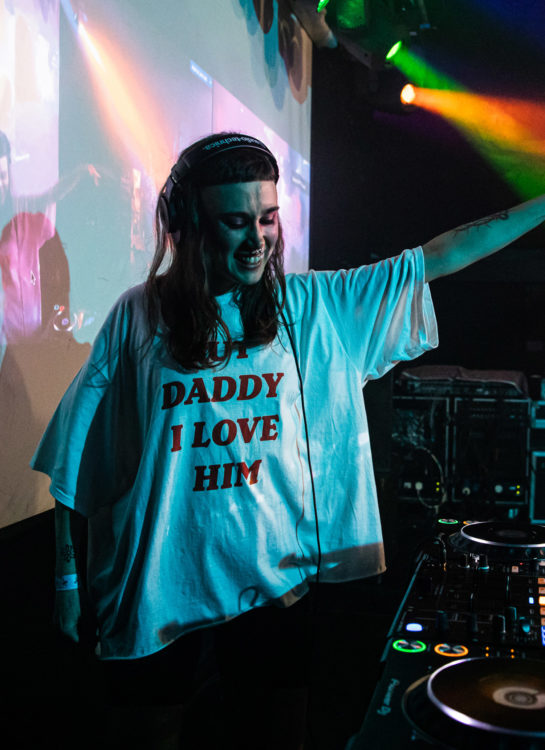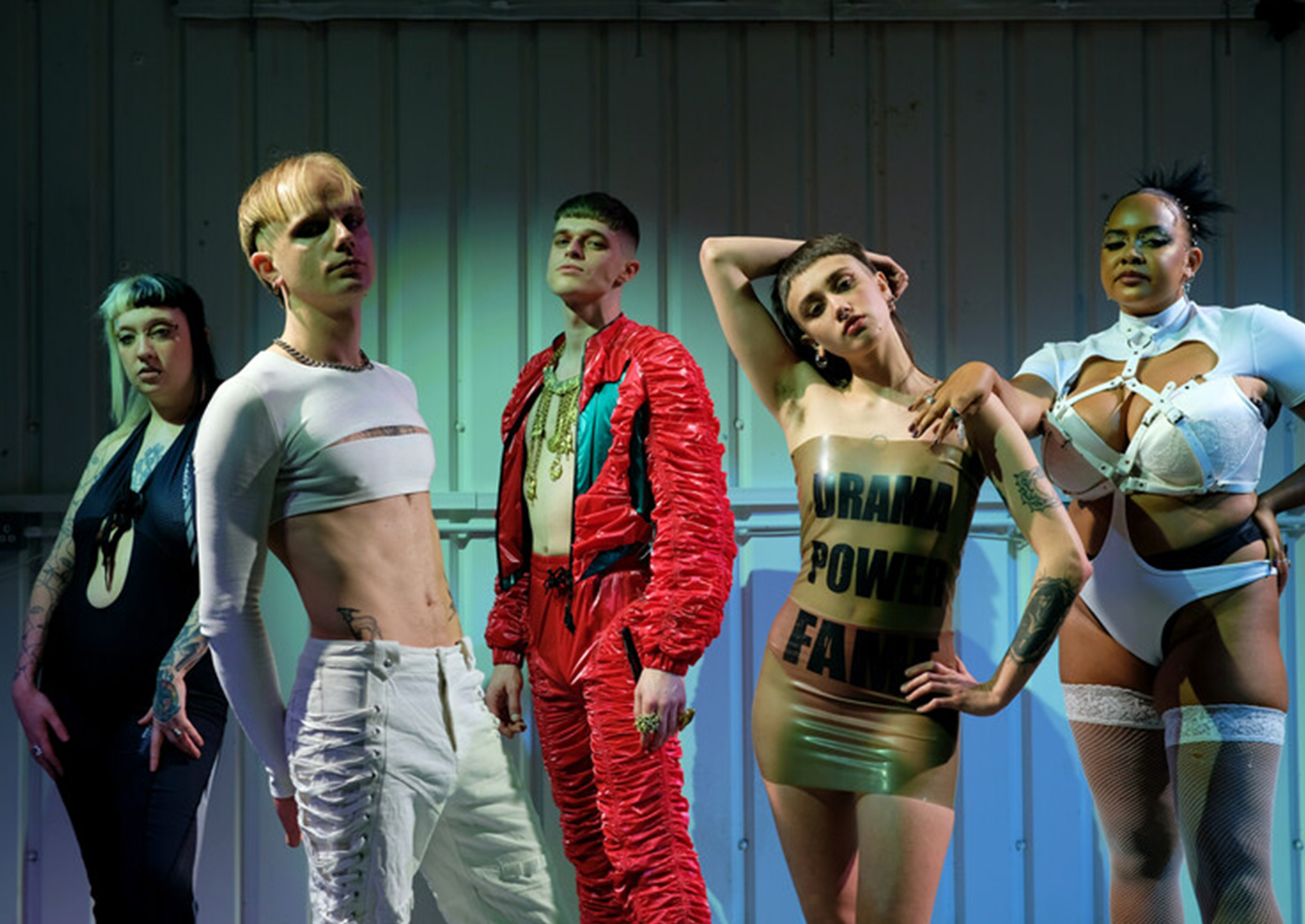- Words Notion Staff
Award-winning community platform Queer House Party sit down to speak life after lockdown, grassroots activism and celebrating 50 years of David Bowie.
There ain’t no party like a Queer House Party. Since the collective launched their lockdown livestreams, they’ve cultivated a unique brand of LGBTQ+ activism; “If I can’t dance, it’s not my revolution” reads their Instagram bio, and you’d struggle to find many people who disagree. Started in an overpriced house share in south east London, between five DJs and events organisers (Watcha, Harry, Passer, Liv and Taali), the party sought a positive solution to lockdown’s growing adversity, becoming a mainstay on the clubbing circuit ever since.
On their first stream alone, thousands tuned in to QHP’s beautifully chaotic set. Offering a community to like-minded ravers in search of escapism, the collective has taken their early success and ran with it, growing from strength to strength. Nowadays, they shut down parties across the globe: from Secret Garden Party to Sziget and Boomtown to Wilderness, festivals are craving the QHP experience and revellers are flocking to the tents to get their fix.
A few weeks ago, the collective celebrated its three-year anniversary at The Yard in Hackney Wick. Packed with big beats and bad bxtches, the event encompassed the unhinged culture that QHP have championed during its existence. On the 21st of April, the trio will be throwing a special party for the Southbank Centre to commemorate 50 years of David Bowie’s seminal ‘Aladdin Sane’ album. “We’re so honoured to celebrate the queer legacy of Bowie and to be a part of this historic series of events”, Harry tells us over email: a giddy excitement radiating from their message.
In honour of their impactful three years, we sit down with Watcha (Co-founder & resident DJ) and Harry Gay (Founder and co-organiser) to speak life after lockdown, grassroots activism and celebrating 50 years of David Bowie. Tap in below.


You describe Queer House Party as a “DJ collective, community platform and award-winning queer party that’s accessible, radical, DIY and punk AF” – what does being punk AF mean to you? How would you describe your events to someone unfamiliar with them?
Watcha: When we started the party in lockdown, we bit-by-bit assembled a team to put on our weekly parties for the community comprised of frontline workers, mutual aid activists, accessibility workers and people supporting causes we saw as central to our queer identities: refugee and migrant solidarity, homelessness, labour organising, sex worker rights, trans rights, anti-racism. At some point, the term ‘punk af’ started getting chucked about in the zoom chat and it stuck.
We have a shared agreement that queerness is defined by its opposition to the extractive, oppressive structures of late-stage capitalism, rooted in racism and imperialism, and we’re committed to putting our money where our mouth is – we’ve always sought to use our platform and the parties to emphasise intersections of oppression and the necessity of solidarity. We recognise that this solidarity can take many forms, from fundraising, to giving the stage over to blasting out Britney in the rain outside a TERF conference!
During lockdown you ran online parties which offered a fun break from the monotony. How important was it to bring communities together in an uplifting way? And how have you found the transition going back to in-person events again?
Queer people have always had to be creative in finding spaces to come together, and historically this has been most prevalent in clubbing spaces. During the lockdown, we were all busy working frontline jobs for different services. As a household of DJs and event organisers we were trying to work out what we could bring to that community aside from the support sessions that were already running. Everything launching at the time had been focused on the negative aspects of lockdown and the pandemic, but we didn’t see anything that wanted to uplift people. That’s what inspired us to create the first online stream. Before we knew it, we were doing them at least once a week, and so many people relied on it as a way to get through their lockdown.
One of the best things about touring has been the number of people that still come up to us and share memories from that time. We keep the online element at all of our own organised events so that people who have been joining us from outside of London and who prefer to party at home can still join us.

Your 3-year anniversary was on the 24th of March – what are you proudest of that you’ve achieved over these three years?
Harry: It’s been such an exciting three years, and we’ve worked so hard to make the party what it is today. I’m really proud of all the work we’ve done to make the party a space like no other in London. I’m proud of all of us for constantly leveling up our skills as DJs, hosts, and performers. The five of us were very much amateurs when we launched the party, and we’ve really grafted get the crazy opportunities that keep coming through.
One of the best things about our events is our crowd: the hottest, kindest, and most supportive and loving queers who hit up our events.
You highlight a lot of important issues across your platforms, from the Green and Black Cross to the counter-protest against Turning Point UK – how can people best get involved with activism?
Watcha: We’re all big advocates of direct action-based activism, but that’s by no means the only way to get involved! If you want to get involved but don’t know where to start, look at groups working in the community you’re based in – copwatch and anti-raids groups have proliferated across the country in recent years, and are a good way to tap into and resist the ways in which state violence is enacted around us. Lots of mutual aid networks that were established during the pandemic are still running and have become solidarity hubs – there might be one of these near you!
Think, too, about what you care about and where help is needed. For example, being trans in the UK is fucking dire right now, and cis people are urgently needed to provide support, through physical solidarity at demos to financial support to organisations like We Exist and Queercare, to standing up to transphobia as and when you come across it!
Britain is in what can only be described as chaos at the moment. If you were running the country, what would you be doing different? Essentially, what is your version of a utopia or what would a QHP Britain be?
Watcha: QHP is abolitionist and anarchist so we believe a utopian UK would be run by the people for the people. No police, no borders, no prisons! Tranarchy now! Poppers for the people.

You’ve been nominated for a Diva Award in the LGBTQIA Scene Event of the Year category – what does it mean to you to receive recognition for the work that you’ve been doing? What other queer events in London would you recommend for those entering the scene?
Watcha: We were so gassed to hear we’d been nominated for that award, thank-you so much Diva magazine! It’s a huge compliment that established organisations recognise what we’re doing, and we hope that it means the things we care about are reaching a bigger audience.
You’ve got an event coming up on the 21st of April – can you let us in on any secrets we can expect from the event?
Harry: On the 21st we’re throwing a special party for the Southbank Centre to celebrate 50 years of David Bowie’s Aladdin Sane. We’re so honoured to celebrate the queer legacy of Bowie and to be a part of this historic series of events. There are no secrets, we will be turning up and shutting it down. If you haven’t attended one of our events before – get ready, Let’s dance, babes!
What’s next for Queer House Party?
We have the busiest year with lots of really exciting bookings coming up! The summer is full of dreamy festivals and parties; we also might have a little tour in the works for the end of the year!
Three years is a huge milestone for us, and we’ve decided to take a little break from throwing our own parties to focus on our intentions, dreams, politics, and how we live them as a party. Grassroots organising has always been our lives, and we want to take some time to consider what it means to be Queer House Party in this time of political unrest and queer hatred from the government.
When we do return to organising our parties in London, they will undoubtedly be bigger and better than ever. We’re so excited about what the future of Queer House Party could be.

